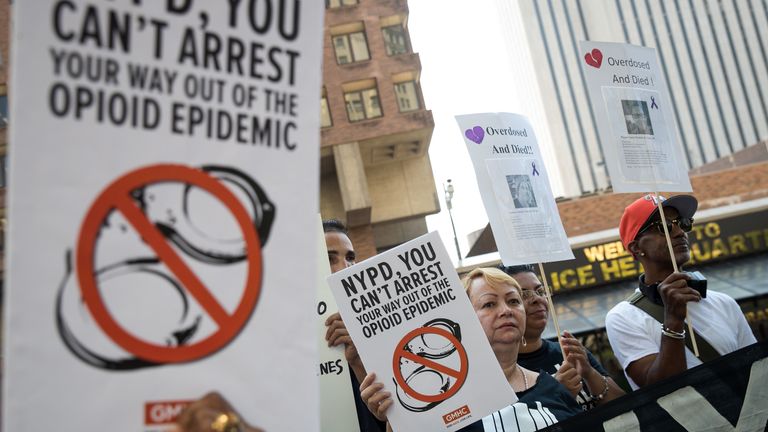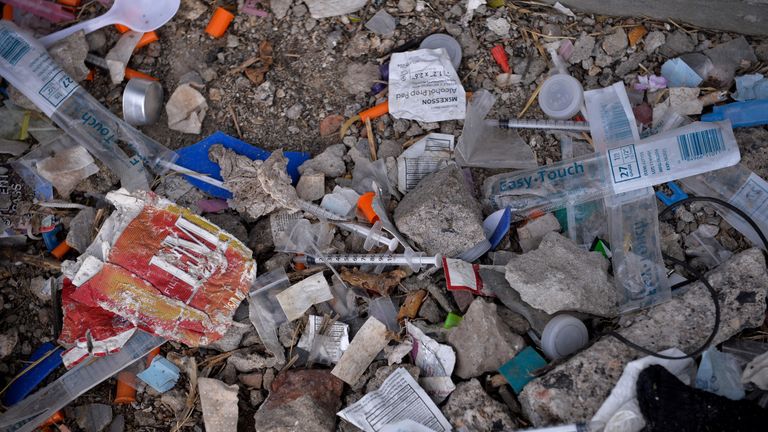It's no secret that the United States has a painkillers crisis.
More than 400,000 Americans are estimated to have died during the last two decades due to their addiction to opioids.
However, when the history of this crisis is written up, today may prove a crucial date. Because today marks the start of a court case that could set a precedent on whether states can sue pharmaceuticals companies and hold them accountable for the crisis.
If the precedent is set, it could open the industry up to a host of legal challenges, potentially seeing Big Pharma dragged through the US courts just as Big Tobacco was from the mid-1950s until it reached a $206bn "master" settlement in November 1998.
Today's case sees Johnson & Johnson, the world's biggest pharmaceuticals and consumer healthcare company, pitted against the state of Oklahoma.
Mike Hunter, Oklahoma's attorney-general, argues that J&J's marketing deceptively played down the risk of patients becoming addicted to painkillers and also alleges that the company, along with others, pressured doctors to prescribe the drugs.
He says that the consequences of the "public nuisance" created by this marketing campaign could cost Oklahoma up to $17.5bn (£13.8bn) to tackle with programmes addressing drug addiction and abuse.
Opening his case, Mr Hunter told the state court in Norman, Oklahoma: "This is the worst man-made public health crisis in our state's history. To put it bluntly, this crisis is devastating Oklahoma."
There are at least four fascinating aspects to the case.
The first is that J&J is fighting it alone. When Mr Hunter launched proceedings, it was against three companies, one of which was J&J. But Oklahoma has now settled out of court with the other two.
Purdue Pharma, maker of what is arguably America's best-known painkiller, OxyContin, settled the claims in March this year with a payment of $270m (£213m) while a second drug maker that was due to face trial, Teva Pharmaceuticals of Israel, reached an $85m (£67m) settlement at the weekend without admitting any wrongdoing. That leaves J&J, whose opioid products trade under brand names such as Nucynta and Duragesic, on its own in the dock.

The second aspect is that Oklahoma is using a law – public nuisance – that is usually deployed in cases concerning offences such as illegal dumping and noise pollution. It is something of a risk for the state because a judge in North Dakota recently threw out a case brought by that state against Purdue on the grounds that the law had not been extended to the sale of goods.
However, in an earlier attempt to get the Oklahoma case thrown out on similar grounds, J&J failed. Mr Hunter, who launched proceedings just under two years ago, has finessed the arguments against J&J down to one single accusation.
J&J's main defence is likely to centre on the suggestion that the three companies marketed what were perfectly legal products, regulated by the US Food & Drink Administration (FDA), but cannot be held responsible for deaths caused by illegal abuse of the drugs.

Evidence will be supplied from more than 200 people and is expected to include harrowing accounts of the suffering of addicts from former addicts themselves, their families and their doctors. Ian King
The third interesting aspect to the case, which is expected to last for two months, is that it is likely to carry echoes of the cases fought against Big Tobacco. Evidence will be supplied from more than 200 people and is expected to include harrowing accounts of the suffering of addicts from former addicts themselves, their families and their doctors. The state's legal team includes a lawyer whose niece died as a result of an opioid overdose.
Should Oklahoma win, a further 2,000 cases are said to be in the offing, brought by other cities, US states, Native American tribes and others anxious to recoup some of the cost of dealing with the addiction epidemic.
Oklahoma is a good test case because it is fairly typical of states that have an opioid crisis.
According to the US National Institute on Drug Abuse, there were 10.2 deaths for every 100,000 Oklahoma residents in 2017, slightly lower than the national rate of 14.2. However, its level of prescriptions is higher than the US average, with 88.1 prescriptions for every 100 people in 2017. And that is falling: in some previous years, according to Oklahoma's legal filings, there have been more prescriptions written for painkillers than there are Oklahoma residents.
The fourth fascinating feature of the trial is Mr Hunter himself. He has previously described himself as a Reaganite Republican who is sympathetic to big business but, earlier this month, told a think-tank: "Sometimes businesses do bad things – and this is one of those instances."
Apart from the other potential litigants, Wall Street will also be watching proceedings closely, for fear of what fate might befall other drug companies.

Sky News
[contfnewc] [contfnewc]






